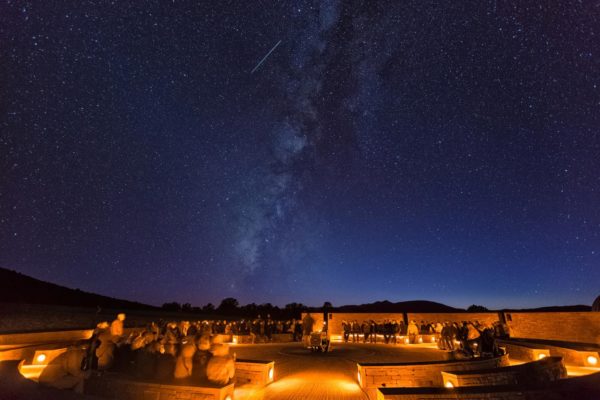Where do park rangers from across the country go to learn about one of our greatest natural resources – the night sky? They go to the McDonald Observatory in West Texas.
For more than 75 years, the McDonald Observatory has led the nation in night sky outreach and education aimed at the public. Now, it is the first observatory to offer this type of training to the National Park Service.
Together, they are designing activities for visitors to the national parks and creating a curriculum for park rangers about the importance of dark skies.
Marc Wetzel, the observatory’s senior outreach program coordinator, led the first workshop this April.
“This is a really fantastic partnership,” says Wetzel. “Dark skies are one of the parks’ natural resources, in addition to water, mountains and wildlife. The National Park Service shares similar goals for interpreting the night skies for visitors as we do.”
The first event was a success. Many rangers came to the park knowing little about astronomy and walked away inspired to share its role in the parks.
“I knew about the North Star but didn’t know how to find it. Now I feel empowered to do an astronomy interpretive talk and share what I have learned with my family, my community and our park visitors,” says Amanda Curtis of Amistad National Recreation Area.
Astronomy outreach is part of the McDonald Observatory’s continued effort to protect and preserve the dark skies of Texas and the nation as future generations continue to explore, discover and learn about the universe in which we live.
The collaboration with the National Park Service was inspired by the McDonald Observatory’s work with the Texas Parks and Wildlife Department to protect dark skies at night.
Located near Fort Davis, Texas, the observatory boasts the darkest night skies of any professional observatory in the continental United States. It hosts hundreds of public star parties each year, showing tens of thousands of visitors a range of objects in the night sky through multiple telescopes and naked-eye tours of the constellations. The observatory also provides daily programs for visitors to safely view the sun.
It is home to the consortium-run Hobby-Eberly Telescope, one of the world’s largest, which recently completed a $40 million upgrade. An internationally known leader in astronomy education and outreach, the McDonald Observatory is also pioneering the next generation of astronomical research as a founding partner of the Giant Magellan Telescope in Vallenar, Chile.
“We are extremely pleased to join forces with the McDonald Observatory to bring this training to NPS park and regional office staff,” says Ray Sauvajot, associate director for natural resource stewardship and science for the National Park Service. “The observatory’s experience with hands-on training combined with the expertise of our Natural Sounds and Night Skies Division will provide new opportunities for career development, capacity building for the field, and leveraging our efforts toward enhancing visitor experience and the preservation of our national park night skies.”




